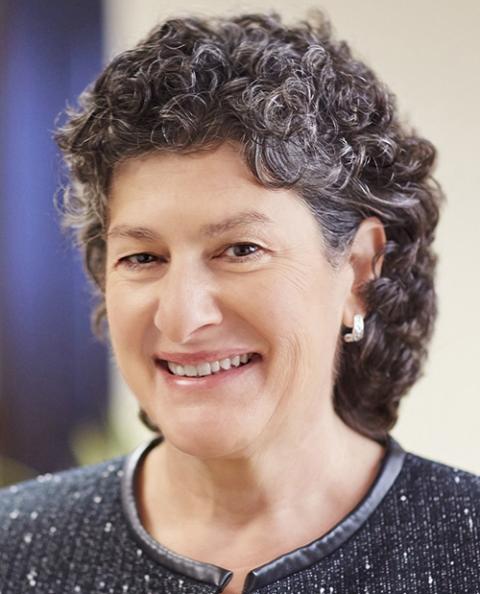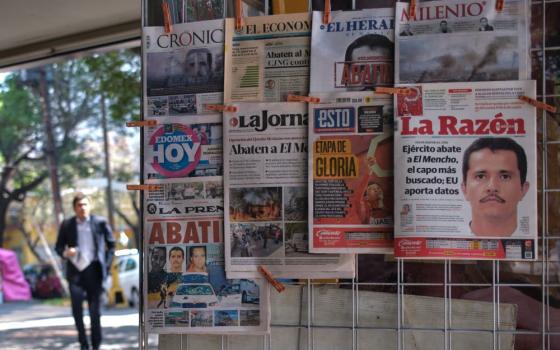The Peace Monument, named Grief and History, is pictured at the U.S. Capitol in the hours before a partial government shutdown in Washington, Sept. 30. (OSV News/Reuters/Jonathan Ernst)

As the U.S. government embarks on a shutdown — one that could be over by the time of publication, or go on indefinitely — Mercy Sr. Mary Haddad, president of the Catholic Health Association of the United States, urges Congress to reconcile in order to "extend vital health and safety net programs that millions rely on."
"A government shutdown jeopardizes the health and stability of millions of families — especially those living paycheck to paycheck and communities that depend on essential services," Haddad said in an Oct. 1 statement. "The ripple effects of inaction extend across the economy, deepening hardship for those already most vulnerable."

Mercy Sr. Mary Haddad (CNS/Courtesy of CHA)
"When partisan gridlock leads to a shutdown, those who are poor, sick, and marginalized suffer most — precisely those we are called to protect," Haddad said. "Failure to act — whether by not funding the government or by allowing critical health programs to lapse — will result in higher health care costs, the loss of coverage for millions, and damaging disruption to the delivery of care in underserved American communities."
Laurie Carafone, executive director of Network Catholic social justice lobby, pointed out that without government funding, subsidies for the Affordable Care Act will end, so families buying health insurance through the government marketplace could see their premiums more than double, from an average of $460 a month to $1,087 a month.
"Health care is a human right, and members of Congress chose to shut down the federal government rather than protect affordable health care," Carafone said in a statement. "The Speaker of the House cancelled work this week for his members rather than deal in good faith with the crisis at hand. That is irresponsible.
"NETWORK continues to support a bipartisan funding bill that protects health care, especially for millions of people immediately at risk of losing it. With Affordable Care Act enrollment beginning in less than a month, there is no time to waste."
Carafone said people who cannot afford the higher premiums will go without health insurance, and in some states the increases will be even bigger.
"In Mississippi and Alaska, premiums will increase by over 300%," she said. "That puts lifesaving care out of reach for millions and raises healthcare costs for all."
Adrian Dominicans speak out against gun violence
A recent shooting and fire at the Church of Jesus Christ of the Latter-Day Saints in Grand Blanc, Michigan, has prompted the Adrian Dominicans to speak out against "the terrifying nightmare of gun violence in our nation," according to a congregational statement. Grand Blanc is about two hours north of Adrian.
They also speak on "the urgent need for members of Congress to enact laws that ban military-style assault weapons and provide for safe and responsible gun use."
"Our hearts ache for the victims and their families," the sisters said. "We pray for their healing and that of all the Mormon children, women, and men who suffered the trauma of this violent attack while in prayer with God."
Advertisement
They noted that their sister Dominicans in Sinsinawa were longtime teachers at Annunciation Catholic Church and school in Minneapolis, where a gunman killed two children and wounded 21 other people who were at Mass Aug. 27.
"During the past 15 years, people of faith have been victims of gun violence not only in various Christian churches but also in two Jewish synagogues, a Sikh temple, and outside of an Islamic mosque," the sisters wrote.
"As longtime educators, we have seen how the horror of gun violence in schools added security barriers to entrances and made lockdown drills a heartbreaking part of every American child's school life. It is deeply disturbing to think that the rise of gun violence in our nation's sacred places of worship might lead to barricaded sanctuaries."
St. Thérèse of Lisieux relics begin US tour
The sacred bones of a much-loved French Carmelite nun began a tour of the U.S. on Oct. 1 at a suburban Detroit parish named in her honor.
St. Thérèse of Lisieux, born Thérèse Martin, is pictured in the Carmel of Lisieux in an undated photograph. Before her death at 24, she spent nine years of religious life at the Carmelite convent. (OSV News/Carmel de Lisieux)
Nicole Scheier was among those who arrived hours ahead of the first opportunity to catch a glimpse of the relics of St. Thérèse of Lisieux.
"St. Thérèse is a saint for everybody. She is relatable. She teaches that sainthood is attainable, doing small things with great love," Scheier said after pausing before a statue of St. Thérèse outside the National Shrine of the Little Flower Basilica in Royal Oak, Michigan.
A reliquary containing some of St. Thérèse's remains will be on display through Oct. 8, before moving on to California. Other stops on the tour, which runs into December, are Arkansas, Florida, Louisiana, Maryland, Missouri, Texas, Wisconsin and Washington, D.C.
Haifa Gabbara also arrived at the basilica well in advance.
"St. Thérèse means a lot to me and to my family," the West Bloomfield Township resident said. "So, I was determined to be here, although early."
The National Shrine was founded in 1926, as one of the nation's first parishes dedicated to the memory of the saint born Thérèse Martin, who died of tuberculosis in 1897 at age 24.
Nicknamed "The Little Flower of Jesus," St. Thérèse became known worldwide for her autobiography, Story of a Soul, which described her devotion to God. She was canonized by Pope Pius XI in 1925. Mother Teresa took her name and said she was inspired to serve the poor in India.
St. Thérèse's relics last came from France to the U.S. in 1999. Tens of thousands visited Royal Oak that year during a one-day stay. Now, a quarter-century later, they were back on the Little Flower's feast day (Oct. 1).
"It feels like Christmas morning that a wonderful gift from God is coming here to be with us," said Fr. John Bettin, rector of the National Shrine of the Little Flower Basilica.





